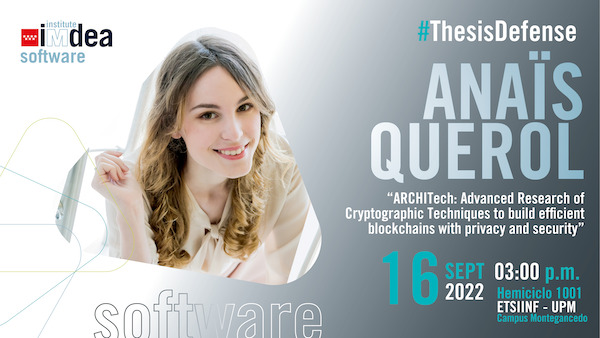
Former IMDEA Software Institute PhD student Anaïs Querol, supervised by Professor Dario Fiore, defended her thesis last September at the Superior Technical School of Computer Science Ingineering from the Universidad Politécnica de Madrid (ETSIINF). In it, she presents cryptographic advances to create efficient blockchains that preserve transaction privacy and security.
As Anaïs explains in the abstract of her thesis, Internet was conceived decades ago as a protocol for the telematic interchange of information through networks of interconnected machines. But it has been suffering from structural problems for long, such as the centralization of services and the high level of trust that must be placed in the servers; leading to what are known as bottlenecks and cyber-attacks.
Blockchain was born in this scenario. A decentralized and transparent technology that arrived to improve the web as we know it.
Blockchains are lists of transaction records linked together and are secure due to the use of cryptographic methods distributed along the network nodes. Their main utility is to store information in a verifiable and immutable form; that is, a user can check the integrity of the data in them.
Modern cryptography offers tools such as zero-knowledge proofs (ZKPs), which make it possible to harmonize privacy and transparency. This means that it is possible to verify blockchain properties without leaking private information. In addition, there are other mechanisms such as SNARKs, which allow to verify it in an efficient way without losing security.
Querol’s work demonstrates that by combining methods such as SNARKs and cryptographic commitments (CP): CP-SNARKs; modular blocks that respect privacy can be generated and combine with each other easily and securely with a compiler so that developers can create transparent and decentralized blockchains with all the guarantees of privacy and security, efficiently.